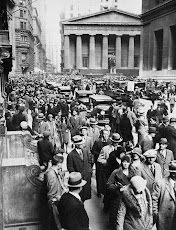Preparations for economic misery led crime wave are being made in Australia, UK, and in parts of the US. Others will join the preparation bandwagon as unemployment rises in the coming year. Researchers point to a one-year time lag between the onset of significant negative financial events that cause economic misery (including unemployment, loss of purchasing power, asset devaluation) and crime waves. Preparations are now being made for this likely consequence of our steep financial downturn. From recent headlines we read the following.
Australia's Victorian police warning as hard times spur crime wave
The Australian reported on 12/27/08, "POLICE are bracing for a new wave of economic crimes driven by the financial crisis and rising unemployment, such as theft and burglary, after studying crime patterns from the previous downturn. Senior officers have drawn on crime statistics from the 1990 recession, when so-called property crime jumped sharply, to pinpoint the types of offences expected to rise as the financial crisis deepens."
The Australian further reported, "By tracking crimes over the past six months, police have found offences such as theft of valuables from motor vehicles, house burglaries, street robberies, handbag and wallet theft, shoplifting and other types of theft have begun to rise, as they did in 1990. Victoria's Deputy Commissioner of Police Kieran Walshe told The Weekend Australian: "We are starting to see crimes against property beginning to trend upwards. We have also seen an increase in petrol theft and those sorts of things. "Those are the kind of things potentially that are going to increase if you have a slowing economy. Particularly as unemployment starts to rise, that's going to cause people in some circumstances to seek other means of getting money."
With the article, the Australian reports, “Crime figures show that, in 1990-91, there was a sharp jump in property crime in Victoria compared with the previous year. Theft rose 13.6 per cent, robbery 12.3 per cent and burglary 8.1 per cent. The rates of those crimes began falling again as the economy began to pick up in following years. Victoria Police this month arrested a gang that had carried out eight ram-raids on retail outlets in Melbourne's northern and western suburbs in recent months, resulting in $700,000 in stolen and damaged property. About $150,000 in stolen goods was recovered. Mr Walshe said research on previous economically driven crime sprees would help develop preventative strategies, such as increasing police patrols in certain areas or encouraging the community to be more vigilant. “
UK public officials prepare for crime wave
Martin Gill, Ph.D., the well-respected criminologist cross-over Academic/Practioner, wrote the following this past week in his monthly Perpetuity newsletter to industry colleagues -- "Will crime rates rise with the failing economy? The Home Secretary, Jacqui Smith, certainly thinks so warning that violent crime could grow by nearly a fifth based on increases seen during the 1991-2 recession. But the academic evidence suggests that won't be the only crime type that's set to rise; fraud, forgery, burglary, robbery, theft, and arson have all been linked to recession and unemployment So what does this mean for you? It's clear that at a time when budgets are being reduced cutting back on security is not an easy option; with crime rates set to rise cutting back on security could result in rising costs of crime. Instead it's a good time to review your existing processes to identify any opportunities to improve efficiency and work smarter to cut costs, achieving greater value for money. "
US law enforcement prepares for crime wave, not uniformly, but in noticeable hotspots
Within the US, police chiefs are preparing for a coming crime wave of sorts, from the experienced professionals such as Chief Bratton of LAPD, to others that are dealing with increasing crime rates in south Florida, the Midwest and other locations impacted by economic misery harder than most.
skip to main |
skip to sidebar


A blog on economic misery and crime waves, particularly those that follow significant economic shocks.
Thoughts and musings on Economic Misery and Crime Waves
Blog Archive
-
▼
2008
(31)
-
▼
December
(10)
- Fears of Crime Wave Grow in Canada
- Australia, UK, and US prepare for financial crises...
- Unemployment continues to rise; business capital s...
- Lessons from Life in the Great Depression (1930s)
- Recent Business Leaders Survey reporting upwards o...
- New US War Front -- Mexican Border Corruption and ...
- Massive job losses since September 2008, Portends ...
- Second Great Depression Not Off The Table
- News report - Bad Economy, Dangerous Holiday Shopping
- LA Police Chief - Bucks Trend - Increases Officer ...
-
▼
December
(10)
Crime Prevention Resources
About the author

- Severin Sorensen, CPP
- Severin Sorensen, CPP, is President & CEO of Sikyur LLC, a security management consulting firm that advises Chief Security Officers (CSOs) and their direct reports; other C-level executives and boards of directors; www.sikyur.com. A detailed bio is available at Sikyur.com and Linkedin.com.
Copyright Notice
This blog and its contents are written by Severin Sorensen, CPP, and (c) Copyright 2008 by Severin Sorensen, CPP and Sikyur LLC, PO Box 3310, Gaithersburg, MD 20885. Individuals citing this blog in other works should use the following bibliographic method.
Sorensen, Severin, "Enter Article Title," Weblog Post. Economic Misery and Crime Waves. Date. http://d2crimewave.blogspot.com/.
Example: Sorensen, Severin. "Contrarian View - NPR broadcasts story that Bad Economies do not lead to crime waves." Weblog post. Economic Misery and Crime Waves. 21 Nov. 2008.
Sorensen, Severin, "Enter Article Title," Weblog Post. Economic Misery and Crime Waves. Date. http://d2crimewave.blogspot.com/.
Example: Sorensen, Severin. "Contrarian View - NPR broadcasts story that Bad Economies do not lead to crime waves." Weblog post. Economic Misery and Crime Waves. 21 Nov. 2008.